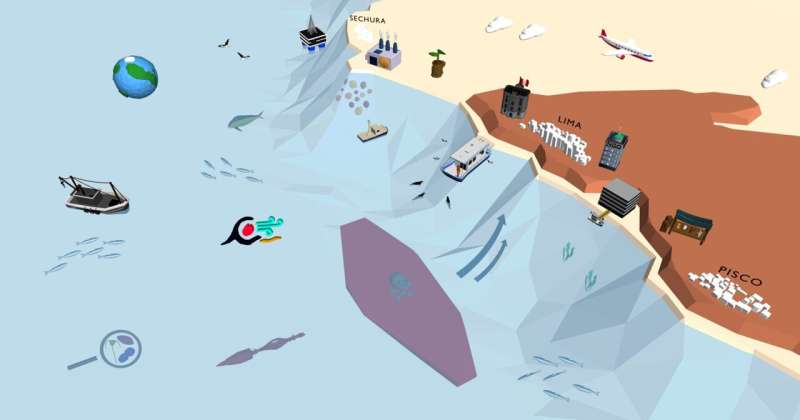This article has been reviewed according to Science X's editorial process and policies. Editors have highlighted the following attributes while ensuring the content's credibility:
fact-checked
peer-reviewed publication
trusted source
proofread
Researchers develop new adaptation strategies to mitigate climate change impacts on coastal fisheries off Peru

The sea off the west coast of South America is one of the most productive fishing grounds of the world. In the Humboldt Current system, upwelling of cold and nutrient rich waters stimulate the growth of plankton that in turn serve as food for commercially exploited fish species, such as anchovy or mahi-mahi. Changes in the ecosystem due to increasing ocean warming does not only have an impact on the health of the oceans and fish populations in the region, but also on the worldwide fish and seafood market.
In the Humboldt-Tipping project, scientists from Germany and Peru led by Kiel University have comprehensively investigated these relationships in the Humboldt upwelling area off the coast of Peru for four years and developed adaptation strategies together with local user groups to the changing environmental conditions. The research and its results from the first phase are published in the form of a virtual exhibition that can be visited online.
Journal articles from the project have also been published in Natural Resource Modeling, Ecological Modelling, and Science.
Climate change has a direct impact on one of the most important fish areas in the world. Ecological, social and economic dynamics are closely linked in the Humboldt upwelling area like in hardly any other region on earth. About 8% of the global catch of marine resources come from the coasts of Peru. About 80% of the total catch is exported as fishmeal and fish oil as main ingredients of aquaculture feed, for example to China and Norway.
Declining fish stocks cause local and global impacts
"In particular, the consequences for the global fishing economy are difficult to address without adaptation strategies that are both co-developed and subsequently supported by local user groups," says Professor Marie-Catherine Riekhof from the Center for Ocean and Society of the Kiel Marine Science (KMS) research priority area at Kiel University and coordinator of the Humboldt-Tipping project, which explicitly takes a holistic and transdisciplinary approach.
Together with Peruvian scientific partners, researchers from Hamburg, Bremen and Kiel have built up a network of fishers, associations, municipalities and user groups from aquaculture and tourism and have developed methods with them on site to be able to adapt to the changing conditions. The initial basis for the work was the analysis of potential effects of a change in the nitrogen cycle in the Humboldt upwelling area. Inorganic nitrogen is a key nutrient that limits the growth of phytoplankton in many marine ecosystems.
"However, our model analyses show that changes in plankton have far less impact on the productivity of fish stocks than expected. Rather, the results suggest that offspring survival and changes in the habitat itself have a major impact on stock fluctuations," says Dr. Mariana Hill from the GEOMAR Helmholtz Center for Ocean Research Kiel, who had been working on possible biogeochemical tipping points in the Humboldt-Tipping project.
Ecosystem models were also created and climate projections were analyzed to make predictions about tipping points and future climate conditions. The projections show possible collapse or decline of some key species such as anchovy, but also steady changes such as near-surface warming in the Humboldt upwelling area.
No signs of abrupt habitat tipping points: Adaptation is still possible
"We currently see no signs of tipping points of the entire ecosystem," says Dr. Giovanni Romagnoni from the Center for Ocean and Society of Kiel Marine Science (KMS). "The rather gradual decline in species diversity suggests that new species may be able to occupy the niches of those species that are predicted to collapse due to climate change, and thus take over their ecological role," says marine biologist Romagnoni, who recently moved from the Leibniz Center for Tropical Marine Research to Kiel University.
In order to investigate the effects of different management options for dealing with tipping points, one of the work packages in Humboldt-Tipping created a conceptual framework, the so-called "Window of Tipping Point Analysis (WTPA)." With this, the different stakeholders can explore their options to act. "Good institutional frameworks can play a decisive role in mitigating negative consequences or even turning them into positive ones. In the second phase of Humboldt-Tipping, we want to concretize these adaptation strategies to the changing environmental conditions," says project leader Riekhof.
More information: Marie‐Catherine Riekhof et al, To tip or not to tip: The Window of Tipping Point Analysis for social‐ecological systems, Natural Resource Modeling (2022). DOI: 10.1111/nrm.12357
Mariana Hill Cruz et al, Understanding the drivers of fish variability in an end-to-end model of the Northern Humboldt Current System, Ecological Modelling (2022). DOI: 10.1016/j.ecolmodel.2022.110097
Renato Salvatteci et al, Smaller fish species in a warm and oxygen-poor Humboldt Current system, Science (2022). DOI: 10.1126/science.abj0270
Journal information: Science
Provided by Kiel University




















